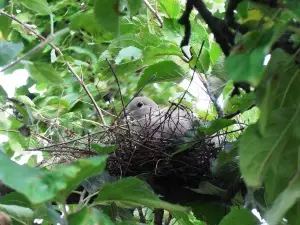
Pigeons don’t have a very good reputation with humans. Some people, in urban and suburban areas, will give them bread to eat, but others will shoo them away because they are not fans of pigeons.
There are many articles online explaining different methods to get rid of pigeons and their nests. But why are pigeon nests so bad? This article looks into it
Table of Contents
Why are pigeon nests so bad?
Pigeons are sometimes called “rats of the sky”, they are called this because these birds are known to carry a variety of diseases that can transfer to other animals and to humans as well.
These birds are also known to damage cars and buildings with their poop. Here is why their nests are so bad:
The nests can carry diseases:
Pigeon nests, when first built, aren’t very sturdy. The nests are constructed using straw, sticks, and twigs from the environment, all these materials are combined to create a saucer-like structure that pigeons can nest in.
The birds will then start to poop in these nests, the nests become strong and rigid as more poop is added. The poop becomes dry and hard and this makes the nest strong and rigid.
You can get sick if you touch the poop on a pigeon’s nest.
Pigeon poop contains a fungus called Cryptococcus, this fungus causes a disease called Cryptococcosis. You can become ill with this disease if you inhale the dust produced by a pigeon’s poop.
Symptoms of this condition include a dry cough, chest pains, fatigue, fever, headaches, and nausea to name a few.
Histoplasmosis and Psittacosis are also associated with pigeon poop. If you touch soil, or water, contaminated by pigeon poop then you can also become ill.
Everyone should avoid coming into contact with pigeon poop but people with compromised immune systems should especially avoid coming in contact with pigeon poop.
The nests attract mites:
It is common to find mites in pigeon nests or, near pigeon nests. Mites are attracted to pigeon nests because these insects can hide away in the pigeon’s nest, they are also attracted to the pigeons themselves.
Mites feed on the blood of birds like sparrows, chickens, starlings, and pigeons. These insects may need the blood of birds to survive but mites can bite humans too.
If a mite bites you, then you can develop small red bumps on your skin, you can develop itching and swelling as well. If you scratch, and break your skin while scratching, then you can develop a secondary bacterial infection.
The nests attract other insects:
Insects of all types are attracted to pigeon nests. In addition to attracting bird mites, pigeon nests can also attract other insects like clothes moths, mealworm beetles, and carpet beetles.
If these insects make their way into your home, they can do some damage. Clothes moths can chew through your fabrics, mealworms can contaminate your food, and carpet beetles can cause an allergic reaction in humans.
These insects may not be able to kill you, but they aren’t great to have around, and will become a nuisance that needs pest control to get rid of.
FAQ:
Do pigeons come back to the same nest?
Yes, they do. Nest building is quite a tedious process for pigeons, so if a pigeon builds a nest it will abandon it, but come back to it, even after a year of abandonment
These animals will only build a new nest if the old one was compromised and can’t be used again
Why would a pigeon leave its nest?
Pigeons are usually very devoted parents and will stay in the nest raising their young, but there are reasons why they may leave the nest
Reasons include eggs not showing progress, pigeons fearing a predator that is getting too close to the nest, the parents may also choose to abandon their eggs if they become sick.
Also, if there are environmental issues, like heavy rain or extreme heat, the nest will be deemed non viable by the parents and they will leave the nest
How do you get rid of a pigeon nest?
Depending on where you are in the world it may or may not be legal to get rid of an active pigeon nest. You’d need to check with your national and local laws before disposing of the nest.
If the law in your area states that it is illegal to kill, or injure, pigeons then it is also likely illegal to get rid of an active nest. An active nest is a nest that is still being used by pigeons.
You can dispose of the pigeon’s nest once the nest is no longer being used by these birds. This should not take too long, pigeon eggs take around 18 days to hatch and the hatchlings take 25 -32 days to leave the nest after hatching. This becomes 45 days in midwinter.
When disposing of a pigeon’s nest, make sure that you protect yourself by wearing a mask, a long sleeve top, long pants, and wash your hands well afterward.
You can dispose of the nest by wrapping it in a plastic bag, and then placing it in a sealed trashcan so that predators cannot get to it.
If you enjoyed this article then you may also be interested in other bird related articles. Here are some articles that you may be interested in: How To Stop Pigeons From Laying Eggs, How To Scare Pigeons With Sound, Signs Your Bird Is Going To Lay An Egg, Why Do Birds Eat Other Birds?, How To Keep Big Birds Away From Feeders?

